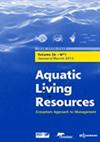迈向渔业的跨学科决策支持过程:多学科研究人员的经验和建议
IF 1.9
4区 农林科学
Q3 FISHERIES
引用次数: 0
摘要
将政策重点转向基于生态系统的渔业管理(EBFM),需要整合知识和学科,并让利益攸关方参与支持决策过程。科学家通过(i)参与式研究项目、(ii)利益相关者伙伴关系和(iii)机构科学咨询流程为这一目标做出贡献。理解科学家在这些过程中的作用,科学家、利益相关者和管理者在知识整合中的相互作用的本质,以及科学与政策之间的联系,是解决跨学科挑战的一个新兴研究领域。2018年,Ifremer-UMR AMURE组织了“渔业中的科学、伙伴关系和决策支持”研讨会,汇集了来自自然科学和社会科学的国际科学家,根据20个具体案例研究进行了审查。研究结果表明,支持渔业决策的科学-利益相关者-管理者伙伴关系可以在向EBFM过渡中发挥重要作用。为促进这一转变,提出了八项建议,涵盖不同参与者的作用、伙伴关系的期望、能力建设、社会科学的整合和供资结构。此外,还建议未来关于可持续渔业和其他海洋利用的研究和创新框架方案应明确包括促进跨学科办法和制定最佳做法的机制。建立网络和发展反思性方法来回顾EFBM决策支持的跨学科方法的经验和实践,将有助于设计下一代跨学科平台,并为EBFM产生可操作的知识。本文章由计算机程序翻译,如有差异,请以英文原文为准。
Towards transdisciplinary decision-support processes in fisheries: experiences and recommendations from a multidisciplinary collective of researchers
The shifting policy focus towards Ecosystem Based Management in Fisheries (EBFM) requires the integration of knowledge and disciplines and the engagement of stakeholders to support decision-making processes. Scientists contribute to this through (i) participatory research projects, (ii) stakeholder partnerships and (iii) institutional scientific advice processes. Understanding the role of scientists in such processes, the nature of the interactions between scientists, stakeholders and managers in knowledge integration and the link between science and policy is an emerging field of research addressing transdisciplinary challenges. In 2018, Ifremer-UMR AMURE organized the workshop ‘Science, Partnership and Decision-support in Fisheries’ bringing together international scientists from natural and social sciences to conduct a review based on twenty concrete case studies. Findings indicate that science-stakeholder-manager partnerships for decision-support in fisheries can play an essential role in the transition to EBFM. To foster this transition, eight recommendations are presented that cover the roles of the different participants, the expectations of partnerships, capacity building, the integration of the social sciences, and funding structures. Further, it is recommended that future research and innovation framework programmes into sustainable fisheries and other ocean uses should explicitly include mechanisms to foster transdisciplinary approaches and the development of best practices. Building-up networks and developing reflexive approaches to review experiences and practices for transdisciplinary approaches in EFBM decision-support will contribute to design the next generation transdisciplinary platforms and generating actionable knowledge towards EBFM.
求助全文
通过发布文献求助,成功后即可免费获取论文全文。
去求助
来源期刊

Aquatic Living Resources
农林科学-海洋与淡水生物学
CiteScore
2.30
自引率
0.00%
发文量
10
审稿时长
>24 weeks
期刊介绍:
Aquatic Living Resources publishes original research papers, review articles and propective notes dealing with all exploited (i.e. fished or farmed) living resources in marine, brackish and freshwater environments.
Priority is given to ecosystem-based approaches to the study of fishery and aquaculture social-ecological systems, including biological, ecological, economic and social dimensions.
Research on the development of interdisciplinary methods and tools which can usefully support the design, implementation and evaluation of alternative management strategies for fisheries and/or aquaculture systems at different scales is particularly welcome by the journal. This includes the exploration of scenarios and strategies for the conservation of aquatic biodiversity and research relating to the development of integrated assessment approaches aimed at ensuring sustainable and high quality uses of aquatic living resources.
 求助内容:
求助内容: 应助结果提醒方式:
应助结果提醒方式:


